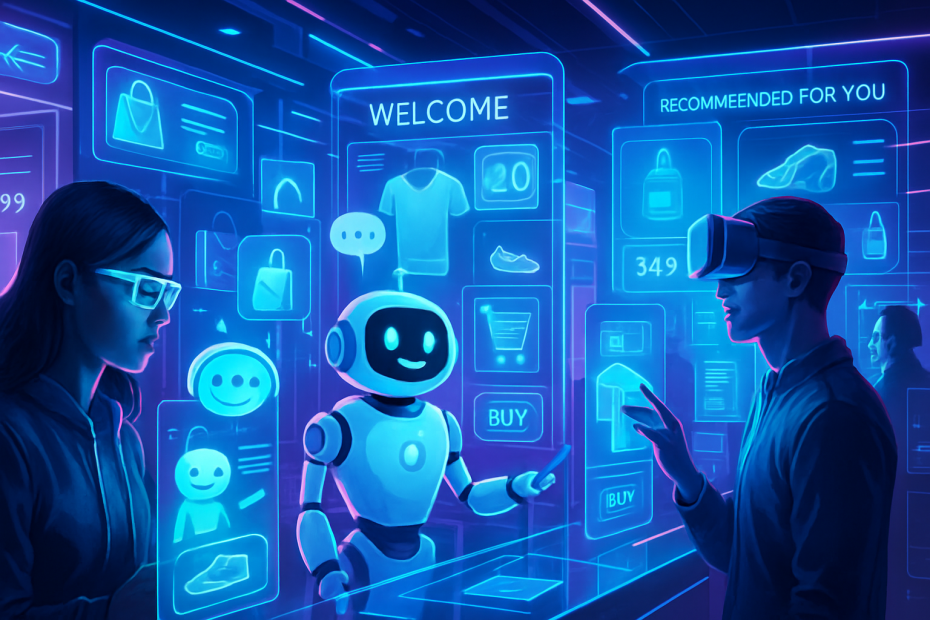Artificial Intelligence (AI) is dramatically reshaping ecommerce in 2025, making it one of the most transformative technologies for online shopping. With an AI-enabled ecommerce market valued at $8.65 billion in 2025 and expected to grow rapidly, businesses and consumers alike are reaping the benefits of smarter, faster, and more personalized shopping experiences.
This article explores in detail the AI applications driving this revolution, supported by recent data and expert insights.
The Growing Impact of AI in Ecommerce
The global AI-enabled e-commerce market has seen unprecedented growth, reaching a valuation of $8.65 billion in 2025, with forecasts pointing to $22.6 billion by 2032, at a compound annual growth rate (CAGR) of 14.6%. This surge is driven by ecommerce companies investing heavily in AI to stay competitive across marketing, logistics, customer service, and personalization.
According to surveys, 89% of companies in retail and consumer packaged goods sectors currently use or are testing AI solutions. Further, 97% of retailers plan to increase their AI investments this fiscal year, signaling a shift from experimentation to strategic deployment.
This adoption means AI is no longer optional—it has become foundational for ecommerce platforms focused on improving customer experience and operational efficiency. Brands leveraging AI witness faster purchasing decisions, higher conversion rates, and sustained customer loyalty.
Personalized Shopping Experiences: The AI Advantage
AI powers highly personalized shopping journeys by analyzing consumer data like browsing patterns, purchase history, and real-time interactions. Companies use machine learning algorithms to deliver custom-tailored product recommendations, dynamic pricing, and targeted marketing campaigns.
This level of personalization captures shopper intent early, reducing choice overload and dramatically increasing conversion rates. Research highlights AI-driven personalization can boost ecommerce conversion rates by up to 15%, while returning customers exposed to AI recommendations spend 25% more on average.
In 2025, personalized emails, push notifications, and website adaptations based on AI insights are becoming standard practices, enabling retailers to nurture better customer relationships and grow lifetime value.
AI Chatbots and Virtual Assistants: Revolutionizing Customer Service
Customer service is experiencing a revolution through AI chatbots and virtual shopping assistants. These tools provide 24/7 instant responses to inquiries about products, order status, returns, and promotions, greatly reducing response times and operational costs.
Advanced chatbots now utilize natural language processing (NLP) to understand nuanced customer questions and even offer upsell or cross-sell options tailored to user preferences. Data shows AI chatbots increase e-commerce conversion rates by four times compared to non-AI chat support.
As customers prefer quick, accurate answers during their buying journey, AI-powered virtual assistants have become essential to reducing friction and improving overall shopping satisfaction.
Optimizing Inventory and Supply Chains with AI
AI’s influence extends deeply into ecommerce operations, especially inventory management and supply chain optimization. Predictive analytics help retailers forecast demand, identify sales trends, and adjust stock levels to avoid shortages or overstock.
AI tools also enhance logistics by automating warehouse management, optimizing delivery routes, and forecasting supply chain disruptions. Such innovations reduce logistics costs by up to 20% and inventory holding by 30%, translating directly into operational savings and improved customer trust through reliable delivery performance.
By making supply chains more agile and efficient, AI enables ecommerce businesses to scale sustainably in the face of global market volatility.
AI and Emerging Technologies: Augmented Reality, Voice Commerce, and Beyond
The future of AI in ecommerce is closely tied to other emerging technologies transforming the customer experience. Augmented Reality (AR), for example, lets shoppers virtually try products before buying, whether it’s placing furniture in their living room or trying on clothes digitally.
Combining AR with AI-driven personalization creates immersive shopping that builds customer confidence and reduces returns. Voice commerce, powered by AI, is growing rapidly as smart speakers become shopping assistants, allowing consumers to order products through natural language voice commands.
AI-driven live shopping, blockchain integration for secure payments, and hyper-local delivery logistics are other frontiers blending with AI to enhance ecommerce in new, meaningful ways.
Financial and Operational Benefits of AI-Enabled E-commerce
AI does not only improve customer experiences but also significantly impacts ecommerce businesses’ bottom line. AI adoption helps increase sales, reduce costs, and optimize marketing spend.
Statistics show that purchases are completed 47% faster when assisted by AI tools, shortening funnel times and increasing throughput in online stores. AI-driven suggestive selling generates between 10% to 30% of revenue for ecommerce retailers.
Innovations like generative AI streamline content creation—automating product descriptions, ads, and marketing messaging—reducing manual workload and boosting marketing efficiency. This allows ecommerce teams to focus on strategy and growth while AI handles tactical tasks.
Conclusion: Embracing AI is Imperative in Ecommerce
AI is fundamentally transforming every aspect of ecommerce—from personalization and customer service to supply chain management and innovative shopping technologies. Businesses that invest in AI-driven solutions gain competitive advantages in customer loyalty, operational efficiency, and revenue growth.
In 2025, AI is no longer an experimental add-on but a core element of ecommerce strategy. Companies integrating AI thoughtfully will create smarter, faster, and more satisfying shopping experiences that meet rising consumer expectations.
Embracing AI means preparing for an innovative future where shoppers enjoy hyper-personalized journeys, businesses operate at peak efficiency, and ecommerce continues its rapid evolution.

“Amazing post, keep up the good work!”
“Great content, learned a lot from this post!”